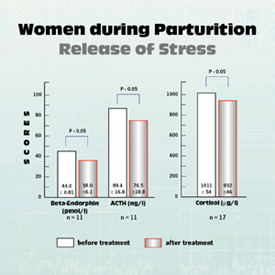- beta-endorphin,
- corticotrophin (ACTH)
- and cortisol
Under investigation were three groups:
- one group of 11 women was treated with relaxing Medical Resonance Therapy Music®,
- a control group A of 11 women listened to music of Mozart – Symphony No. 28 and Coronation Mass – and
- a control group B of 11 women did not listen to any music.
The treatment with the Medical Resonance Therapy Music® resulted in a significant change of the hormonal situation: the beta-endorphin value dropped by 6.05 units and also ACTH showed a tendency to decrease – the hyperproductive hormone system was calmed, hormonal manifestations of stress reduced and a more balanced state established.
Here too a significant change was found in the hormonal situation, but in the opposite direction: the ACTH level increased – the already hyperactive hormone system got even more exaggerated, hormonal manifestations of stress increased.
Control Group B
Here no significant changes were observed, only small variations.
Comments to Cortisol
A significant change of cortisol was neither found in the “Mozart group” nor in the Medical Resonance Therapy Music® group. To get a reliable picture of the changes in cortisol level probably a longer than 30 minute treatment interval is necessary, since its duration is comparable with half the life span of the hormone in circulation.
Investigators:
Prof. Dr. med. A. Reznikov
Prof. Dr. med. S. Leush
Dr. med. V. Reznikov

